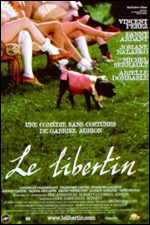
LE LIBERTIN
France, 2000, 103 minutes, Colour.
Vincent Perez, Fanny Ardant, Josiane Belasko, Michel Serrault, Arielle Dombasle.
Directed by Gabriel Aghion.
With its story of French philosopher Denis Diderot and his Encyclopedie Francais, this might be expected to be a serious portrait of 18th century French life, reflection and intellectual work before the Revolution. However, it is not.
Rather, it is what publicists might call a ‘romp’. Some have even suggested that it is a kind of ‘Carry On Diderot’.
Vincent Perez portrays the philosopher Denis Diderot. He was a Renaissance man, with abilities in writing philosophy, novels, plays – and was learned on a whole range of mathematical and scientific issues. Along with such authors as Voltaire, he paved the way for the Age of Reason which culminated in the French Revolution.
Here he is presented as something of a rake. However, at the time the film is set, he would have been sixty years old. His host, the Baron d'Holbach, was in fact ten years younger than he – but appears much older in the film.
The film has a distinguished cast, surprising for the tone of the film. Fanny Ardant portrays Madame Therbouche, an artist, a spy for the cardinal played by Michel Serrault. Josiane Balasko is the host’s wife. Arielle Dombasle is the marquise with whom Diderot is having an affair.
Diderot was the complete rationalist, determined to expose the bigotry and hypocrisies of authority and of the church. However, this is not the main thrust of the film which focuses on his personal and amorous exploits.
More serious films of this period, well worth seeing, include Ridicule and Beau Marchais.
1.A film about 18th century France? The pre-Revolution era?
2.The tone of the film? The history? The farcical aspects of the film? The romp, sex romp?
3.The re-creation of the period, costumes and décor? The sets? The lavish production? The musical score?
4.The reputation of Denis Diderot? An intellectual, an author, playwright, philosopher, scientist? His writing the encyclopaedia? His gathering together of 18th century Enlightenment authors? How evident was this from the film? His wanting to write the article on morality? His continually being interrupted? His own experiences, sexual morality? Seeing Diderot at work?
5.With the baron, with the baron’s wife? Hosts for his work? His relationship with the marquise? Madame Therbouche and her arrival? Wanting to paint him? Naked, his demurring? The arrival of the cardinal?
6.Madame Therbouche, her background, art? The revelation that she was a spy for the cardinal? Her listening to Diderot, empathising with his ideas, changing her mind? Her not giving the information to the cardinal? Her leaving for Amsterdam, the agent for the encyclopaedia?
7.The printing press, its being concealed at the baron’s mansion, his cardinal and his search, the failure to find the press? The cardinal finding it himself? Wanting Madame to help him? Calling the police? The press and its disappearance?
8.The marquise, her relationship with her husband, with Diderot, fashion and style, the depth of the relationship? Superficial?
9.The cardinal, his conservatism, anti-rationalism, anti the encyclopaedia? Using the painter as a spy?
10.A look at 18th century history? From a French perspective? From a light, satiric and comic perspective?